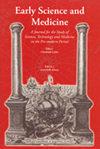Shadows of the Thrown Spear: Girolamo Cardano on Anxiety, Dreams, and the Divine in Nature
IF 0.5
2区 哲学
Q3 HISTORY & PHILOSOPHY OF SCIENCE
引用次数: 0
Abstract
Girolamo Cardano (1501–1576), a preeminent natural philosopher, physician and astrologer of the sixteenth century, is known for the great diversity of his intellectual pursuits and writings. Across much of his work, we find an overriding concern with the dangers of human life, how those dangers might be foreseen, and how their effects can be mitigated. This essay begins by considering the epistemic significance of anxiety as it is described in his autobiography, the De propria vita. When Cardano had devoted so much effort to working out method and sense in medicine and astrology, why do episodes of foreknowledge in the autobiography seem so haphazard and disorienting? I use this question to examine Cardano’s views on the possibilities and limits of human foreknowledge, paying special attention to his treatise on dreams, the Somniorum Synesiorum libri quatuor, and his commentary on Ptolemy’s Tetrabiblos.掷矛的阴影:吉罗拉莫·卡尔达诺论焦虑、梦想和自然中的神性
吉罗拉莫·卡尔达诺(1501-1576)是16世纪杰出的自然哲学家、医生和占星家,以其知识追求和著作的多样性而闻名。在他的大部分作品中,我们发现了对人类生命危险的压倒一切的关注,如何预见这些危险,以及如何减轻它们的影响。这篇文章首先考虑焦虑的认识论意义,因为它是在他的自传中描述的,De propria vita。当卡尔达诺在医学和占星术中投入了如此多的精力来研究方法和意义时,为什么自传中预言的情节看起来如此偶然和迷失方向?我用这个问题来研究卡尔达诺关于人类预知的可能性和局限性的观点,特别关注他关于梦的论文,《梦与联觉》(Somniorum Synesiorum libri quatuor),以及他对托勒密《四部曲》(Tetrabiblos)的评论。
本文章由计算机程序翻译,如有差异,请以英文原文为准。
求助全文
约1分钟内获得全文
求助全文
来源期刊

Early Science and Medicine
HISTORY & PHILOSOPHY OF SCIENCE-
CiteScore
0.50
自引率
0.00%
发文量
22
审稿时长
>12 weeks
期刊介绍:
Early Science and Medicine (ESM) is a peer-reviewed international journal dedicated to the history of science, medicine and technology from the earliest times through to the end of the eighteenth century. The need to treat in a single journal all aspects of scientific activity and thought to the eighteenth century is due to two factors: to the continued importance of ancient sources throughout the Middle Ages and the early modern period, and to the comparably low degree of specialization and the high degree of disciplinary interdependence characterizing the period before the professionalization of science.
 求助内容:
求助内容: 应助结果提醒方式:
应助结果提醒方式:


